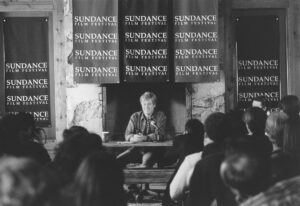Eric Hynes
At a festival that showcases films from around the world, that exposes audiences here and beyond to a wide spectrum of cultures, classes, and political realities, and that was founded by an actor turned influential advocate, it’s apparent that art can have an impact on society. But what kind of an impact? And what responsibility do artists have to the future of our country, the education of our children, and the greater good?
These were among the questions that three renowned artists wrestled with at Power of Story: Making Art Matter, a panel discussion held at the Egyptian Theatre on Saturday. Moderated by Rachel Goslins, who serves as the Executive Director of the President’s Committee on the Arts and Humanities, the panel featured pioneering broadcaster and constitutional rights advocate Norman Lear, stage and screen director and former producer of New York’s Public Theater, George C. Wolfe, and Dave Eggers, prize-winning author, publisher, and co-founder of 826 Valencia, a 7-city circuit of nonprofit writing and tutoring centers.
The following is an excerpt of their fascinating and far-ranging discussion.
On the tangible effects of art in our lives.
Normal Lear: Art starts the conversation. After a couple of thousand years of the Judeo-Christian ethic creating where we are, I’d have to be a fool to think that my little situational comedy [All in the Family] could change things. But it created conversation. The arts have a capacity to hold us together in awe, to get people together in a feeling of one mood. It can start from there.
George C. Wolfe: I grew up in Frankfurt, Kentucky, which for the first five or six years of my life was a segregated town. So when I ended up running the Public Theater, the mission was very personal for me. I wanted to make sure, as much as possible, that nobody would be left out. I think that art is about invasion. If there’s a landscape that is sacred, artists must work to invade it. If there’s a building that doesn’t feel as though you belong there, you must invade it. And transform it so that it is reflective of you. Because if it’s not reflective of you, it isn’t human. We must take art on so that it begins to reflect the full complexity of who we are.
Normal Lear: Can we afford to broaden the word artist? Because there’s a touch of the artist in every human being. The reason people respond to art is because they have a touch of it. It’s central to being a human being.
On the importance of the arts in education.
Rachel Goslins: The arts are often seen as a luxury, a frill. There hasn’t been a larger adoption of a message that the arts are good for kids’ development, the way that sports or science are. That the arts are good for your kids whether or not they’re artsy.
Dave Eggers: We all know that kids don’t go to school to get tested. They go to school to be empowered, to learn something, to be enlightened and feel that they belong and have a voice. And to have their brains lit on fire every day. We’re not going to do that by teaching to the test constantly. If you just teach to the test, you’re not going to have kids that can create and innovate and think of new solutions. And you’ll find that schools that have fewer arts programs, graduation rates and SAT test scores drop pretty steadily. It’s incredibly short-sighted. We have to remember to educate the whole child, and to make sure that creativity is at the center of all curricula. It has to be an untouchable aspect of education.
Normal Lear: I think the systemic disease of our time is short-term thinking. And the center of that disease is in corporate America. Where the corporation has to deliver, quarter by quarter, a better product. There’s nothing anywhere in life that suggests anything can grow forever. Yet that’s the demand, and it has permeated our culture. The arts require space and time and sentiment, all those things that are so rare in a culture that is racing. I’ve never known a time when people’s lives have been so emotionally crowded.
On making art personal and communal.
Rachel Goslins: At home and online, more people are personally participating in the arts, but overall the public perception is that art is this thing on the hill that fancy-pants people do.
George C. Wolfe: Art is always and most significant when it’s having an impact on a community, and in an intimate way. Since creating art is so consuming, how much time is left over to reach out? But the reaching out is very important. Inviting community into your journey so that they feel ownership of it.
Dave Eggers: Our favorite thing is when the students leave with a published book, tape bound and typeset, and they consider themselves authors. We have a public reading, the mayor comes, and afterwards they sign their books. They don’t question it, they own it. Open the door just a little bit, they will walk through. There’s no more democratic means for self-empowerment than putting your thoughts on paper and making it permanent.
Rachel Goslins: I’m struck by how many artists do such passionate, fantastically effective work for causes they care about it—be it environmental causes, genocide or clean water—yet so few take on the arts as a cause.
Norman Lear: There’s a taint to an actor having a cause. What we’ve never done is said that my being an actor or producer doesn’t separate me from being a citizen. Thank god my career has given me a platform, and you’re going to hear from me not as George Clooney the matinee idol, but as a concerned citizen.
Rachel Goslins: But an artist or celebrity who takes on the cause of the arts has the least credibility problem, as opposed to being an expert on the Sudan or water filtration systems. What we can most convincingly advocate for, as artists, is the arts.
On the promise and peril of technology in regards to the arts.
Dave Eggers: The tools of filmmaking used to be much more expensive and inaccessible, and the means of dissemination are better than they ever have before. That’s all completely positive. The negative is when we channel all of the arts through screens, or we assume that there’s a screen solution to every educational problem. We need to balance it. We’ve got to make sure we concentrate on human-to-human attention. And to make sure that the kids have time to concentrate, to follow through on a long project and solve problems along the way, and end up with a product that isn’t instantly gratifying.
George C. Wolfe: I think there’s something wonderful to be said about joining the world community through technology, and balancing that with joining the immediate community of where you live. If it’s just one or the other, it’s problematic. It is very exciting that technology creates this greater sense that everybody can do it. But everybody should also do it with each other.




